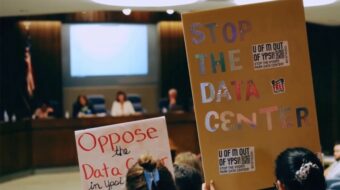
Sometime soon, Big Brother may be watching. That’s because the pilotless aircraft known as drones could soon fill U.S. skies. The FAA proposed new rules for domestic drones, with up to 30,000 estimated to be in operation by 2020. Policemen have already started using them, and for many U.S. citizens, privacy concerns will soon abound.
With two wars winding down, the FAA has reportedly come under pressure from the Pentagon to make stateside use of the robotic aircraft. One of their largest implementations will most likely be security and surveillance. According to a recent report, contemporary U.S. privacy law can’t do much to counteract what could – if misused – soon devolve into oppressive policing.
And that policing, reports indicate, could entail discrimination. In the interest of ‘border patrol,’ U.S. Customs and Border Protection has expressed a strong desire to have access to a fleet of drones; one was already deployed to Arizona in December, and another in Texas two months prior. Officials anticipate a third hitting Florida this summer.
A provision in a 2005 Customs and Border budget request to Congress stipulated that drones could be used for “interior law enforcement support,” meaning they would be made available to police without scrutiny or debate, and without appropriate new laws to regulate them.
The threat that police force drones could pose to undocumented citizens – particularly considering the abusive actions taken against them already in states like Arizona – is a vital issue.
One recent example of drone intervention involves an incident in North Dakota last summer, when police arrested U.S. citizens with the help of a Predator spy drone. The aircraft had circled a 3,000-acre plot of land, eventually tracking down the suspects and leading to their arrest.
There are also, however, important safety concerns involving the issue of drones using the same airspace as commercial vehicles.
Such a prospect concerns Lee Moak, the head of the Air Line Pilots Association, the largest pilots’ union in North America. “There’s no system that allows operators of unmanned flights to spot and steer clear of helicopters and planes, and there aren’t training requirements or standards” for the ground-based ‘pilots’ who guide drones, he said. Unmanned aircraft need to demonstrate that they won’t crash into other planes, he urged, before sharing airspace with them. “We have a long way to go,” he concluded.
On the other hand, used responsibly, and not left entirely in the hands of the government and Big Business, drones could also be beneficial. In particular, they could help farmers across the country, say researchers from the University of Nebraska.
One of the researchers, Dr. Richard Ferguson, noted, “There’s commerical applications [for this.] Anything that lets you look down on a crop during growing season can be very useful.” Aerial images, he said, could help farmers know when to fertilize and irrigate. “Technically, commercial use of drones is not allowed by the FAA.” However, the FAA is revising that policy, he added.
Lon Bohn, a Nebraskan farmer, remarked, “It will need to be worked out, and there are concerns with privacy, regarding who’s flying over who’s property. Satellites are nice, but data isn’t always available, and it’s not always high resolution.” Drones could be an answer to that problem, he suggested.
The University of Nebraska is also experimenting with drones’ potential use by journalists, to get aerial footage of tornado damage or crowded protests.
Ultimately, it looks like the U.S. will need to adapt to the coming exodus of drones from overseas, one way or another.
“Drones raise the prospect of a much more pervasive surveillance,” said Jay Stanley, senior policy analyst with the American Civil Liberties Union’s Speech, Privacy, and Technology project. “We are not against them. They can be valuable tools in certain kinds of operations. But what we don’t want to see is their pervasive use to watch over the American people.”
Photo: Associated Press










